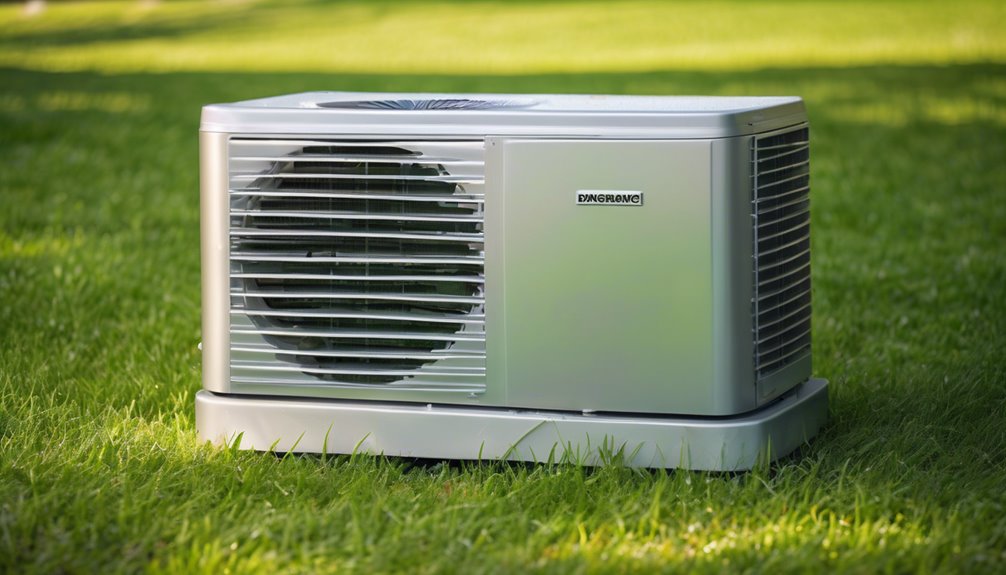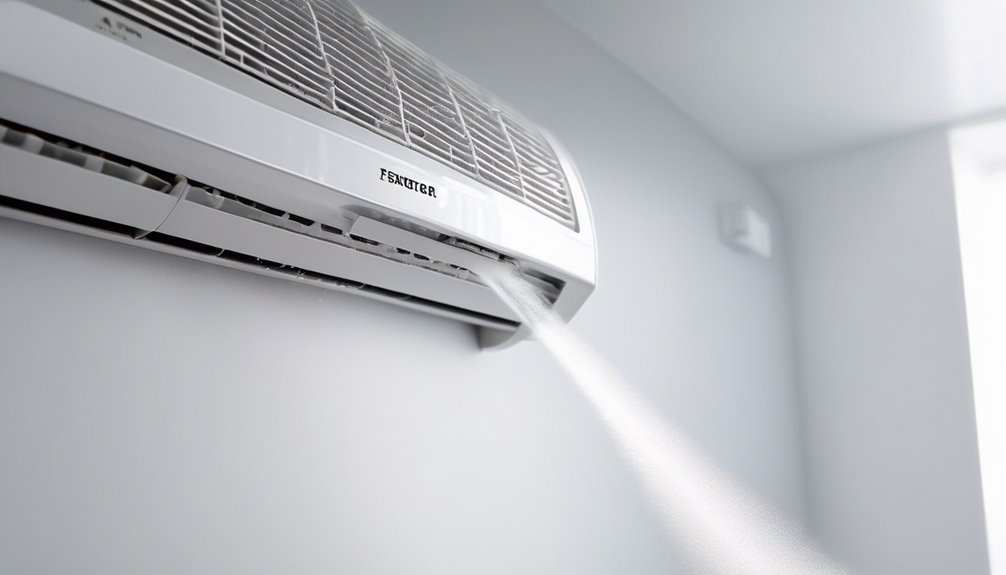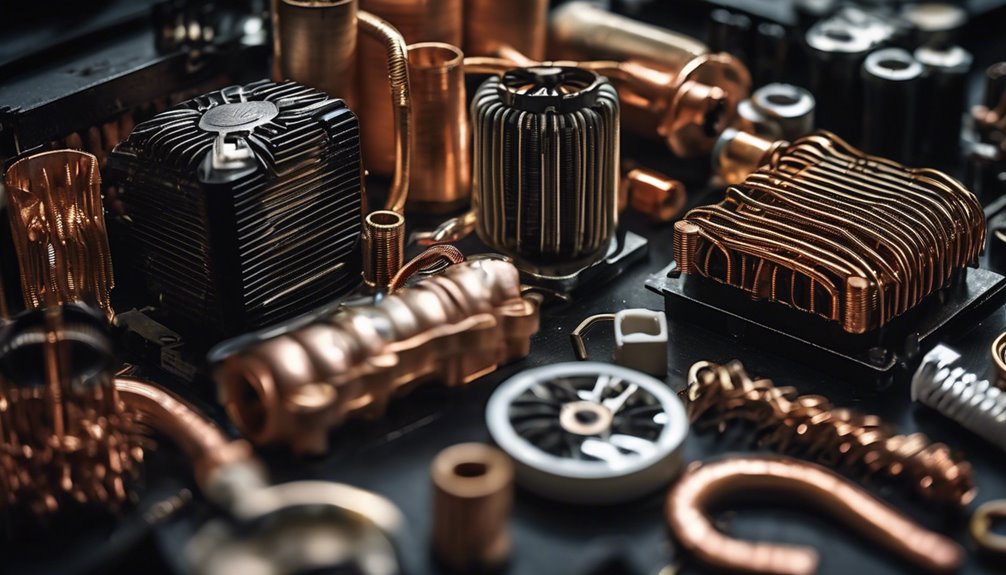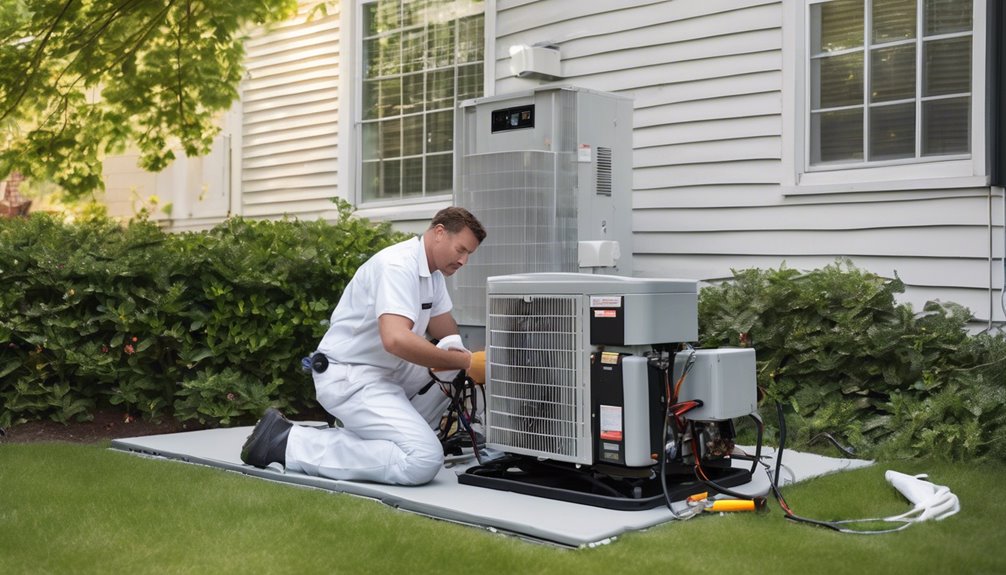When your AC's outdoor unit starts making a weird noise, it's time to investigate. You'll want to turn it off, wait 30 seconds, and then inspect the mounting system, internal components, and refrigerant lines for signs of wear, damage, or leaks. Check for loose screws, broken belts, and faulty fans, as these can cause vibrations and noise. If you're not sure what you're looking for, it's possible that compressor issues, electrical problems, or airflow restrictions are to blame. Keep exploring to uncover the root cause of the noise and take steps to fix it before it's too late.
Key Takeaways
- Turning off the unit and waiting 30 seconds helps pinpoint the source of the weird noise, eliminating mounting issues and fan spinning sounds.
- Inspecting internal components, such as loose screws, fan blades, and motor mounts, can identify the root cause of the noise.
- Refrigerant leaks, system pressure imbalance, and compressor issues can cause unusual sounds, and detecting these problems is crucial to prevent further damage.
- Restricted airflow due to dirty filters, air duct leaks, or blockages can increase noise levels and reduce system efficiency.
- Professional assistance may be necessary to diagnose and repair noise issues, especially if the problem is complex or requires specialized knowledge.
Identifying the Source of the Noise
When you're trying to identify the source of the noise coming from your AC outdoor unit, start by turning off the unit and waiting for about 30 seconds to allow the fans to stop spinning.
This will give you a better chance to pinpoint the source of the noise. Next, inspect the unit's mounting system to ensure it's securely fastened to the ground or wall.
Mounting issues can cause the unit to vibrate excessively, resulting in noise. Check for any signs of vibration sources, such as loose screws or worn-out mounts.
If you find any issues, tighten or replace them as needed. By eliminating these potential causes, you'll be one step closer to identifying the root of the problem.
Loose or Broken Parts
Now that you've ruled out mounting issues, it's time to inspect the AC outdoor unit's internal components for loose or broken parts.
1. Check for rattling screws that may be causing the weird noise.
Make sure they're tightened securely, but avoid overtightening.
2. Inspect the fan blades and motor mounts for any signs of wear or damage.
Vibrating mounts can create a loud rattling noise, so ensure they're securely fastened.
3. Look for broken or loose belts, pulleys, or other moving parts that could be causing the noise.
Refrigerant Leaks and System Pressure
You're probably aware that refrigerant leaks can cause a hissing or bubbling noise from the outdoor unit, but did you know that system pressure imbalance can also contribute to unusual sounds?
In fact, a refrigerant leak can lead to a pressure imbalance, which in turn can cause the compressor to work harder, resulting in increased noise levels.
Refrigerant Leak Detection
Refrigerant leaks can cause significant issues in an AC outdoor unit, including reduced cooling performance, increased energy consumption, and even compressor damage.
You'll want to detect these leaks as soon as possible to prevent further damage.
To do so, you can use the following methods:
- Refrigerant sniffers: These devices detect the refrigerant's unique smell, making it easy to pinpoint the leak.
- Ultrasonic detection: This method involves using specialized equipment to detect the high-frequency sounds emitted by escaping refrigerant.
- Visual inspection: Look for signs of oil or refrigerant residue around connections, valves, and other potential leak points.
System Pressure Imbalance
When refrigerant leaks go undetected, they can lead to system pressure imbalances, which can further compromise your AC outdoor unit's performance.
You'll need to perform system checks to identify the issue. One way to do this is by using pressure gauges to measure the pressure levels in your system. If the readings are off, it may indicate a pressure imbalance.
You can also look for signs of uneven cooling, increased energy bills, or frozen coils, which can all be symptoms of a system pressure imbalance.
Addressing this issue promptly is crucial to prevent further damage to your AC outdoor unit. By catching it early, you can avoid costly repairs and ensure your unit runs efficiently.
Noise Indicating Failure
Your AC outdoor unit's strange noises can be a warning sign that something is amiss.
One common cause of unusual sounds is a refrigerant leak or system pressure issue. These problems can alter noise patterns and noise levels, indicating a larger problem.
- Hissing sounds: Refrigerant leaks can cause hissing sounds as the refrigerant escapes.
- Gurgling or bubbling noises: These sounds can indicate a blockage or restriction in the system, leading to abnormal pressure.
- Loud rattling or clunking: Unusual vibrations or loose parts can cause loud rattling or clunking noises, signaling a serious issue.
Compressor Issues and Failure
As the heart of the AC outdoor unit, the compressor plays a crucial role in cooling your home, and its failure can bring the entire system to a grinding halt. If you notice weird noises like knocking, clunking, or rattling sounds, it may indicate compressor issues. A compressor surge can cause the compressor to vibrate excessively, leading to premature wear and tear. On the other hand, a compressor seizure can result in complete compressor failure.
| Compressor Issue | Description | Solution |
|---|---|---|
| Compressor Surge | Excessive vibration due to refrigerant flow issues | Check and clean the condenser coils, ensure proper refrigerant levels |
| Compressor Seizure | Complete compressor failure due to overheating or lubrication issues | Replace the compressor, check and repair electrical connections |
| Refrigerant Leaks | Leaks in the refrigerant lines causing compressor malfunction | Inspect and repair refrigerant lines, recharge the system |
Faulty or Malfunctioning Fans
Three crucial components in the AC outdoor unit work together to provide efficient cooling: the compressor, condenser coils, and fans.
If you're experiencing weird noises from your AC outdoor unit, faulty or malfunctioning fans might be the culprit.
- Unusual vibrations: If the fan motor is faulty, you might notice unusual vibrations or wobbling when the fan is operating.
- Rattling or clunking sounds: Loose or damaged fan blades can cause rattling or clunking noises when they spin.
- Reduced airflow: If the fan motor is malfunctioning or the fan blades are dirty, you might notice reduced airflow from the outdoor unit.
Check your fan motor and fan blades to identify if they're causing the weird noise.
Ice Buildup and Frozen Coils
Faulty fans aren't the only potential cause of weird noises from your AC outdoor unit.
Another common issue is ice buildup and frozen coils. If you notice your AC is making strange noises, it's possible that ice has formed on the coils or pipes. This can happen when the unit is low on refrigerant or if the airflow is restricted.
Frozen pipes can cause the AC to work harder, leading to unusual sounds. To fix this, you'll need to defrost the unit and clean the coils. Coil cleaning is a crucial maintenance task that can help prevent ice buildup.
Make sure to check your AC regularly to avoid this issue.
Electrical Problems and Faulty Wiring
You've probably noticed that your AC outdoor unit is making more noise than usual, and you're wondering what's causing it.
One common culprit is electrical problems, which can be as simple as a loose connection or as complex as a faulty capacitor. If you're not careful, these issues can lead to more serious problems, so it's essential to identify and address them promptly.
Loose Connection Risks
While inspecting your AC outdoor unit, a loose connection might seem like a minor issue, but it can lead to a cascade of electrical problems.
A loose connection can cause corrosion risks, which can further deteriorate the connection quality. This can lead to more severe issues, such as overheating, short circuits, and even electrical fires.
- Electrical Shock: Loose connections can expose you to electrical shock, which can be fatal.
- System Failure: A loose connection can cause your AC outdoor unit to malfunction, leading to system failure and costly repairs.
- Fire Hazards: Corrosion and overheating due to loose connections can spark a fire, putting your property and safety at risk.
Faulty Capacitor Symptoms
When your AC outdoor unit's electrical system is compromised by loose connections, it's not just the connections themselves that can cause problems – other components can also be affected.
One such component is the capacitor, which can become faulty due to electrical surges or wear and tear. If your capacitor is faulty, you might notice unusual noises, reduced airflow, or the unit not turning on at all.
To diagnose the issue, you'll need to perform capacitor testing, which involves checking for signs of physical damage, rust, or corrosion. If the capacitor is indeed faulty, you'll need to replace it with a new one.
Don't attempt capacitor replacement yourself, as it requires specialized knowledge and tools to avoid electrical shock or further damage.
Blockages and Airflow Restrictions
Proper airflow is essential for the AC outdoor unit to function efficiently and quietly.
When airflow is restricted, the unit has to work harder, resulting in increased noise levels. You should check for blockages and airflow restrictions around your outdoor unit.
- Dirty filters: Clogged filters can reduce airflow, causing the unit to make strange noises. Make sure to clean or replace them regularly.
- Air ducts: Leaks or blockages in air ducts can restrict airflow, leading to noise issues. Inspect your ducts for any damage or debris.
- Debris around the unit: Keep the area around your outdoor unit clear of leaves, branches, and other obstructions that could block airflow.
Signs of Wear and Tear
As you inspect your outdoor AC unit, keep an eye out for signs of wear and tear that could be contributing to the noise.
Look for wear patterns on moving parts, such as the fan blades or compressor, which can indicate excessive friction or misalignment.
Worn moving parts, like fan blades or compressors, can signal excessive friction or misalignment, leading to noisy AC operation.
Age indicators like rust, corrosion, or faded paint can also suggest that your unit is nearing the end of its lifespan.
Check the unit's exterior for dents, scratches, or other signs of physical damage that could be causing the noise.
Additionally, inspect the unit's electrical components, such as wires and connectors, for signs of wear or damage.
Identifying these signs of wear and tear can help you pinpoint the source of the noise and determine the necessary repairs.
Frequently Asked Questions
Can I Fix the AC Outdoor Unit Noise Myself?
You can try DIY troubleshooting before calling a pro, but be cautious: if you're not comfortable with noise diagnosis, you might misdiagnose or worsen the issue, leading to more costs or even safety risks, so consider seeking expert help if unsure.
Will a Noisy AC Outdoor Unit Increase My Electricity Bill?
You're wondering if a noisy unit will hike your electricity bill. Generally, unusual noise patterns can indicate increased energy consumption, which may lead to higher bills.
Can a Dirty Air Filter Cause a Noisy AC Outdoor Unit?
You're probably wondering if a dirty air filter can cause issues. Well, yes, it can! A dirty filter restricts airflow, putting extra pressure on your system, which might lead to noisy operation. Regular filter inspection is key to avoiding this issue.
How Long Does It Take to Repair a Noisy AC Outdoor Unit?
You'll breathe a sigh of relief when you know it typically takes a pro about an hour to diagnose the issue, and with a rushed repair, you'll be back to cool comfort in no more than a few hours.
Will a Noisy AC Outdoor Unit Affect the Indoor Unit's Performance?
You're wondering if a noisy outdoor unit will impact the indoor unit's performance. Yes, it can, as a faulty outdoor unit can reduce unit efficiency and create airflow restriction, making the indoor unit work harder and potentially leading to breakdowns.
Conclusion
You've tried to troubleshoot the weird noise coming from your AC outdoor unit, and hopefully, you've identified the source of the problem. If not, it's time to call a professional to diagnose and fix the issue. Remember, ignoring the noise can lead to further damage, increased energy bills, and even system failure. Don't delay, take action to get your AC running smoothly and quietly again.



